#apollogists
Text

The fact that Python is Apollo's greatest enemy and snake is Asclepius' sacred animal will always be funny
Part 2
#Apollo#Asclepius#greek pantheon#greek mythology#greek gods#mythology#greek myth art#apollogists#dadpollo#python#chiron#toa#pjo hoo toa#trials of apollo#riordanverse#my art
5K notes
·
View notes
Text
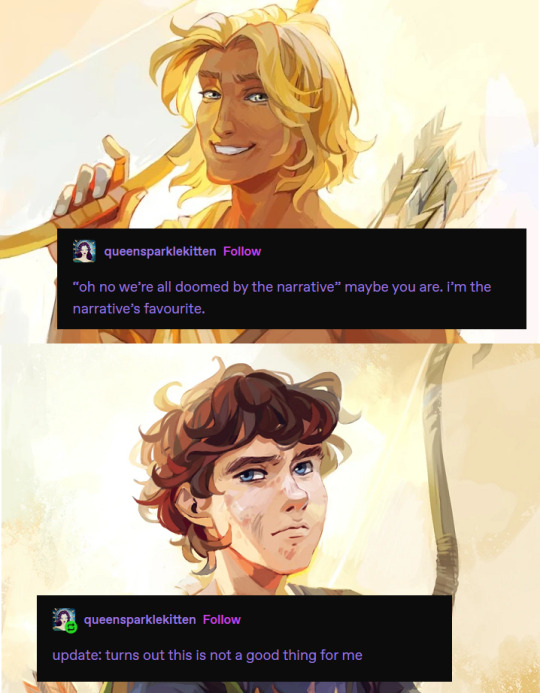
#lester papadopoulos#it's been a while since i blorbo-posted my boy 🥺#apollo#pjo#trials of apollo#toa#apollogists
1K notes
·
View notes
Text
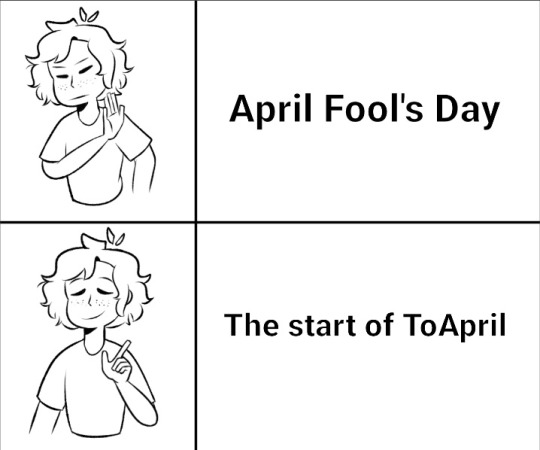
ToApril back! 804 dead, 77 injured
#pjo#toa#rrverse#trials of apollo#trials of apollo memes#apollogists#pjo apollo#lester papadopoulos#toa fandom#holy crap 2 posts within 5 months of each other!
195 notes
·
View notes
Text













I will die for you / I will live for you
Trials of Apollo, The Dark Prophecy • Ch 34-35
#trials of apollo#toa#the dark prophecy#lester papadopoulos#pjo apollo#meg mccaffrey#mine#apollogists#pjo trophonius#i blacked out and woke up to this. tdp fever real#sorry i went insane over this scene btw. it will happen again (has said this 3 billion times b4)#they r everything to me
774 notes
·
View notes
Text
Hermes: the ultimate middle child
And now for the other promised meta!
There was a great discussion on the TOA discord earlier that I got the chance to read once it was over that was basically exactly what I wanted to talk about - Hermes as a character and how he is very subtly contrasted with Apollo in multiple ways.
First, for a curiosity I've had ever since I finished TON. We learn several very interesting things about Hermes in the scene when Apollo returns to the Council:
He initiated the bets on Apollo's success (and then has the nerve to say he was worried about Apollo)
He bet against Apollo (and it was enough money to make him look visibly upset by the loss)
He was not among the gods who looked happy at Zeus' proclamation of Apollo's success (Artemis makes sense for being happy, Dionysus makes sense for not, but Hermes is supposedly a close brother figure in the myths, so what gives?)
He immediately suggested that Apollo cause outright harm to some mortals with his renewed power, despite displaying no such malice in his previous appearances
There is an interesting play of contrast here when you look at Hermes' other notable scene in the Riordanverse - his conversation with Percy at the end of TLO.
Hermes is generally portrayed as much more serious right here. He's grieving Luke's death at this point, but Hermes knew that was coming, and this demeanor is consistent with his other appearances up until this point: put-together, down-to-business, pragmatic, and so on.
This doesn't seem like the same person we see at the end of TON: making jokes, placing bets, and the like. And THEN you go back to the myths and the Hermes there seems much more similar to the one we meet in TON.
My point being, there is a very obvious disconnect here between who Hermes used to be, who he is now, and who he is pretending to be.
And it has a lot to do with Zeus, and as a result, Apollo.
I think there's a twofold reason for this dichotomy: one, Hermes and Apollo have fundamentally contradictory views on both fate and change which have larger implications for Hermes' overall morality; and two, Hermes resents Apollo for being Zeus' favorite when Apollo probably doesn't deserve it (or Hermes believes he deserves it more).
Part I: Fate and Change
I'd like to go back to that conversation between Percy and Hermes at the end of The Last Olympian. The entire conversation is so strange to me: here's a sixteen-year-old who has never had a positive father figure in his life (save Paul, who is still a recent addition to his family at this point) trying to comfort a 4,000-year-old god that he's not a bad father:
"I thought you were a bad father," I admitted. "I thought you abandoned Luke because you knew his future and didn't do anything to stop it."
The main point of that conversation comes from Hermes' response to Percy's statement. To paraphrase, Hermes says 'I couldn't have saved Luke, it's against the laws and I can't defy the fates. I loved him, yes, but I couldn't save him. Those laws aren't going to change anytime soon, and neither are the gods.'
What we get from this conversation is this: Hermes was resigned to being unable to help Luke because he views the future as inevitable and the Fates as all-powerful (as does Zeus). He also doesn't believe that gods can change in the ways Percy wants them to; he scoffs at the idea that Percy's proposed changes will be permanent:
"No one can tamper with fate, Percy. Not even a god."
and then:
He laughed. "After three thousand years, you think gods can change their nature?"
To Hermes? Fate is inevitable and the gods can't change.
On the other hand, to Apollo? The future is behind any number of unlocked doors, and the only thing stopping the gods from changing are themselves:
[Regarding Frank burning his stick in TTT] "Frank went into that tunnel knowing he might die. He willingly sacrificed himself for a noble cause. In doing so, he broke free of his own fate. By burning his own tinder, he kind of... I don't know, started a new fire with it. He's in charge of his own destiny now."
Frank broke free of his fate, and the way Apollo talks about it indicates that he believes that such things are certainly possible.
And this:
[After regaining his godhood in TON] I could only try to be different from [Zeus]. Better. More... human.
Apollo intends to change the way he acts now that he is returned to Olympus, and has the support of everyone else who noted that he has already grown as a person: Jason, Sally, Will, Reyna, and so many more.
I feel like Hermes has always felt that he has the excuse of being a god when Percy asks him to do better for the sake of Luke's memory: "We gods have never been very good at keeping oaths." and "Eventually we'll become forgetful. We always do." and generally lots of other sentiments that give the impression that he believes that failure to do right by mortals is inevitable for gods. He's been so used to thinking that Luke was resigned to his fate from the very beginning, and that Hermes was never capable of changing it. Hermes didn't fail because he didn't try to succeed.
But Apollo ruins that for him when he returns - Apollo has not and will not let that same excuse stop him, and now Hermes is losing the only reason he had for not helping Luke. If Hermes is right, that gods can never help their mortal children and Luke was born to die at Kronos' hand, it was excusable for Hermes to turn his back on his own son. But if Apollo is right that gods can change and you can shape your own destiny, then it was Hermes and his inaction that killed Luke, not Kronos.
And we know that Apollo is right. Apollo did defy his fate. Apollo did change. And Hermes saw it all from the safety of his throne on Olympus.
Which means that Hermes was always wrong, and he knows it now. Hermes says that not helping Luke was the hardest thing he's ever done, because it would have amounted to nothing. Hermes thought he was completely incapable of helping Luke, but Apollo is living proof that he could have.
So now, Apollo is a daily reminder that Hermes failed Luke. Every day.
That would be enough to drive a wedge between any two people, much less two gods. And I don't think Apollo would ever truly realize that this is the case, so one day, Hermes is going to break, and Apollo will be left blindsided.
It only makes sense that Hermes might have some very heavy clown makeup on when we see him at the end of TON. I can't speak for him when we talk about the gambling, but I bet it's because Hermes, like he did with Luke, thought that Apollo would be resigned to his death the very moment Delphi-Python said that "Apollo will fall". And the fact that Apollo survived against all the odds (and seemingly against the Fates themselves) is just another smack to the face. I believe his behavior and comments in this scene are him lashing out in anger and frustration at the solid fact of the matter; that Hermes failed his own family, which is something he values to no end.
That's got to suck.
But now I think we have to closely examine why Hermes believes those things. Hermes has been brainwashed in a sense to believe that he can't defy fate and can't change. By who, then?
Do I really need to answer that? You have a brain. It's obvious, isn't it?
Part II: The fight to be the golden child
Let's rewind a bit, shall we?
The entire discussion had over on discord was started with talking about the potentials of Apollo's relationships with Ares and the rest of his siblings, then someone (I believe it was @fearlessinger, along with some very valid points made by uke) said this:
...but Ares, who was always the least favored of Zeus's children, the family's scapegoat, and who gave up on trying to get on Zeus's good side basically as soon as he was born and deemed a failure… he of all ppl would actually have no reason to resent Apollo for his success, nor for throwing away that success
To which I replied:
so i wonder then who has the reason to resent Apollo the most?...
it’s probably a son, because they’re the ones who have to fight the most for Zeus’ approval ...
maybe Hermes? because he’s never really done anything wrong and still doesn’t receive the title he deserves ...
To summarize: Apollo was the golden child, and used to be Zeus' favorite. We are certain he faces a lot of resentment for this fact (he admits to it himself), and Hermes definitely fits the bill.
Think about it.
Besides Luke, what has Hermes ever done that would put him out of the running for golden child? He's useful, talented, powerful enough to be on the Council, and despite being a god of liars and thieves, is work-driven enough that his father still trusts him. Even in the myths, he's clever in a very Zeus-y way.
Apollo, on the other hand, acts like a complete and utter fool pre-trials. He's vain, self-centered, and shallow. He's a chronic attention-seeker, and, in the myths tried to overthrow Zeus, and had angered him to the point of turning him mortal, not once, but twice. So what gives? Why is Apollo the favorite son, and not Hermes?
Honestly, I couldn't say, besides vague suggestions that it's because Zeus likes the idea of having the powerful and popular son as a favorite, rather than the less noticeable behind-the-scenes son. But who knows how Zeus and his favoritism work. Apollo doesn't, and I don't think Hermes does either.
I rather think Hermes is, as I said in the title, the ultimate middle child. Overlooked by his father in favor of his siblings, whether they be rebellious (Apollo), perfect in every way (Athena or Artemis) or just plain failures (Ares or Dionysus). In comparison, Hermes is invisible, having never done anything to make him stand out in the eyes of his father, nor having done anything that deserves a strict punishment. Nothing worthy of attention.
I've seen people wonder why Hermes never suffered the same consequences for Luke's actions in the way Apollo did for Octavian. But that's because Hermes never broke Zeus' fundamental law: do not interact with your mortal children.
The problems Octavian caused were supposedly because Apollo defied Zeus and created a forbidden connection with his legacy.
On the other hand, the problems Luke caused were because Hermes obeyed Zeus to the letter.
Why would Zeus punish Hermes for being obedient? And why wouldn't Zeus punish Apollo for breaking the 'ancient laws'?
Arguably, Hermes is Zeus' best behaved child (which is ironic, considering a few notable domains of his). Hermes is one of a trend that we see a lot with toxic parents who don't give attention and approval freely - Hermes and Apollo are on opposite sides of this spectrum. Apollo in the past has acted out in order to gain attention, whereas Hermes has glued himself to Zeus' side in an attempt to be perfect.
And this perfection includes indoctrinating into Zeus' belief systems and fears. Zeus fears the inevitability of fate. So does Hermes. Zeus refuses to let the gods change. So Hermes believes change impossible. Zeus says that you may not have contact with your mortal children. And although to Hermes this is the hardest of all, he turns his back on Luke.
And yet, 'golden child' is still not his title to claim. That rests with Apollo, still, who has not met Zeus' standards, openly rejects Zeus' belief systems, and yet continues to rise above the rest.
That is the formula for a deteriorating relationship between brothers: Apollo's mere existence being an everyday reminder to Hermes that he is a failure both to his son and to his father.
Everyone say hello to our old friend resentment.
Now, I'm not necessarily saying that Hermes and Apollo's relationship is inherently negative. But there's a lot of reason for there to be some contention coming from Hermes (and I didn't even touch on May Castellan - basically, I think Apollo refused to oversee her attempt to become the next Oracle because he knew it wouldn't work, which is why he wasn't present for May's attempt, but was for Rachel's; later on, Hermes could start seeing Apollo's domain and subsequent absence as the thing that drove her mad).
We don't have a lot of hints for whether or not he plans to act on those feelings of resentment. But they're there. And in a new, post-trials Olympus, they're going to come to light sooner or later.
Because Percy was right.
"I thought you were a bad father," I admitted. "I thought you abandoned Luke because you knew his future and didn't do anything to stop it."
That's exactly what happened. And because of Apollo, Hermes now knows it.
(a list of my other metas if you'd like to read)
And a very special shoutout to @firealder2005 for writing this absolutely gut-wrenching and angsty but super cool fic based around this very idea that i am absolutely in love with and everyone should go read it ❤️
#toa#riordanverse#trials of apollo#apollogists#pjo#lester papadopoulos#hermes#greek mythology#pjo hermes#toa hermes#toa apollo#pjo apollo#the last olympian#percy jackson#percy jackon and the olympians#heroes of olympus#pjo hoo toa
690 notes
·
View notes
Text
meg and apollo are such a duo actually. like. their families are messed up but they find a new family in each other they literally parallel each other in the abuse narrative they're neighbour colours they're opposite colours they. they're siblings your honor
201 notes
·
View notes
Text
hc that somehow, apollo gets the worlds worst brain freeze and it frustrates him because technically, he probably doesn’t even have a brain. he has developed a love hate relationship with ice cream over it, and has written woeful poetry about it.
bonus: he doesn’t get brain freeze as lester.
#he’s so dramatic#i say as if i didn’t just make this up#riordanverse#trials of apollo#apollo#lester papadopoulos#toa#apollo toa#toa apollo#meg mccaffrey#percy jackson#pjo#heroes of olympus#hoo#apollogists#apollo posting#lester toa#lester papadopoulos textpost#lester papadopoulos headcanon#apollo headcanons
174 notes
·
View notes
Text


Psst pjo fans
I’m still very new to tumblr so I am hoping this reaches the right audience hsjsjsffv hi nice to meecha
#trials of apollo#percy jackson#percy jackson and the olympians#heroes of olympus#meg mccaffrey#apollo pjo#pjo fanart#apollogists#lester papadopoulos#not used to tumblr pls bare with me
159 notes
·
View notes
Text
i will forever think about reyna and apollo parallels.
the finding themselves outside of who they are supposed to be. the natural leadership. the realizing that romantic love is not always the answer, that they can be content with the other types of love there is out there.
it's just... they mean literally so much to me. best characters fr, top two.
also the comedy potentional of this duo is great and immaculate and should not be overlooked
#they are best friends in my mind#argue with the wall#reyna avila ramirez arellano#trials of apollo#pjo apollo#lester papadopoulos#rrverse#apollogists#toa
69 notes
·
View notes
Text
I feel the need to remind everyone that Apollo, Leo and Calypso were chased by the Kool-Aid man

while they were in Ohio
#leo valdez#calypso#apollo pjo#toa apollo#trials of apollo#apollo#apollogists#the trials of apollo#toa#pjo#hoo#percy jackson and the olympians#heroes of olympus#pjo hoo toa#Kool-Aid man#ohio#al post
591 notes
·
View notes
Text
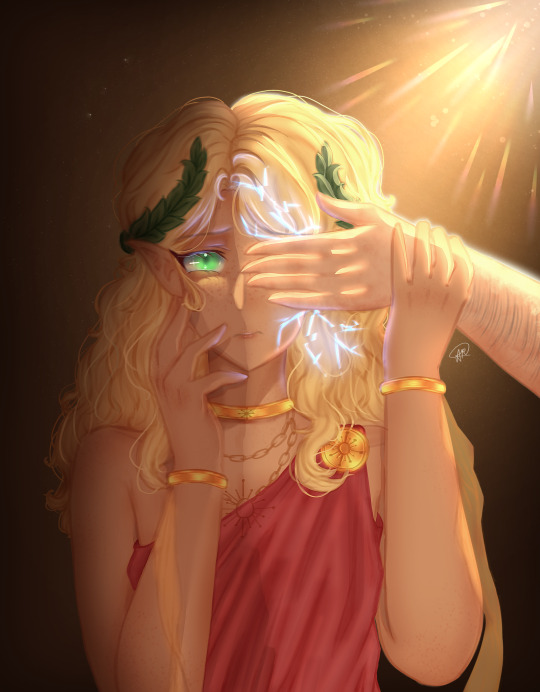
Name your courage now;
We could have had anything, anything else,
Instead you hoarded all that's left of me.
Swallowing your doubt,
Like swords to the pit of my belly,
I want to feel the fire that you kept from me.
#Apollo and Zeus' relationship feel 'The Moon Will Sing' coded#that's probably just me though#I need to draw apollo with the prophecy green eyes more#apollo#lester papadopoulos#toa apollo#apollo toa#toa lester#apollogists#pjo apollo#zeus#pjo zeus#pjo#percy jackson and the olympians#hoo#heroes of olympus#toa#trials of apollo#pjo hoo toa#greek mythology#apollo greek god#apollo greek mythology#apollon#starryseas sketches
247 notes
·
View notes
Text
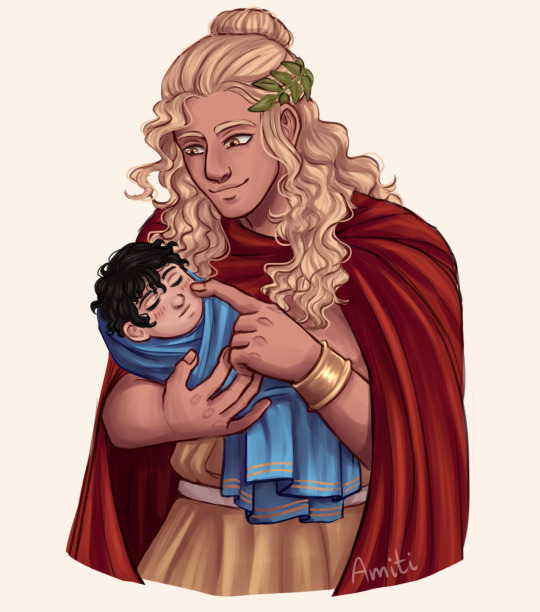


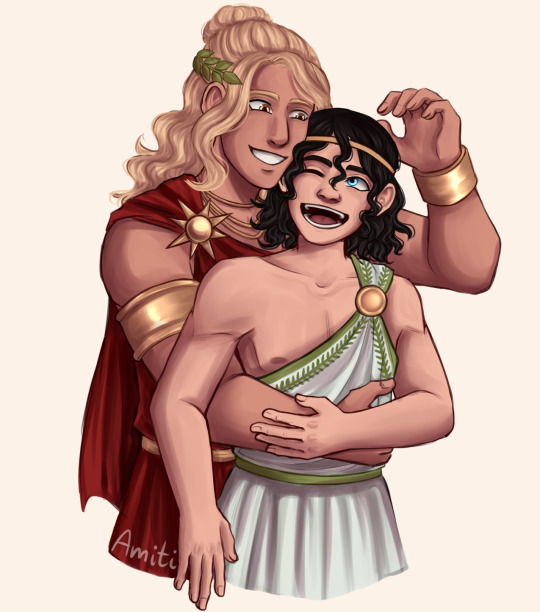
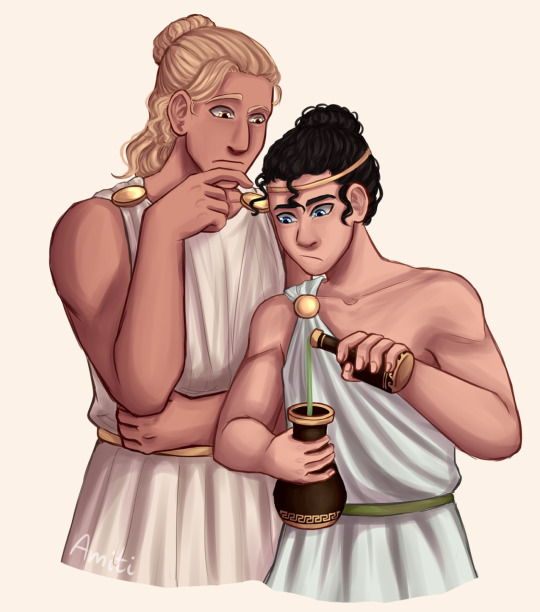
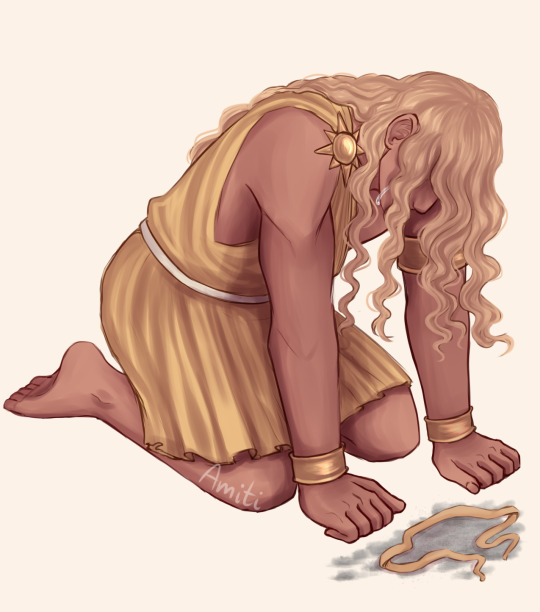
Apollo and Asclepius
At first I wanted to draw Apollo hugging Asclepius' dead body for the last piece but I realized that there would be no body left after a mortal who was struck by Zeus' lightning 😔.
(The hair band survived because it was gift from Apollo and therefore made from the same devine material gods' clothes are made. Before he got this one, Asclepius was always accidentally tearing or losing the previous ones so Apollo wanted to give him one that could not be destroyed so easily)
#despite being Apollo's most famous child Asclepius is criminally underrated#Apollo#Asclepius#Asklepios#greek gods#greek pantheon#greek myth#greek mythology#dadpollo#apollogists#toa#my art#art#mythological
1K notes
·
View notes
Text
You know what Apollo got to do that the other protagonists didn't? Cry. Just completely breakdown from time to time.
The kid protagonists were always like "I have to stay strong, I can't show weakness by crying"
But nah, Apollo just lost it every time there was a slight inconvenience or someone showed him a sliver of kindness, and I applaud him for that
#let the kids cry too rick#trials of apollo#toa#pjo apollo#lester papadopoulos#rrverse#riordanverse#pjo#pjo hoo toa#the trials of apollo#ttoa#apollogists
2K notes
·
View notes
Text

Oh look, a meme that isn't Meg or Apollo centred. Anyways..this acc hasn't been abandoned. Tumblr is just draining me for some reason now.
#pjo#toa#rrverse#trials of apollo#trials of apollo memes#apollogists#lavinia pjo#she is so underrated <3
76 notes
·
View notes
Text
half of me is half of you

#click for better view#txny draws#trials of apollo#pjo apollo#apollogists#lester papadopoulos#rrverse#toa apollo
193 notes
·
View notes
Text
Rick. Buddy. Amigo. Explain something to me. Real quick, I promise.
[The Trials of Apollo: The Tower of Nero, Chapter 4]

Good genetic package, Rick/Apollo? Are you sure about that?
Listen.
Estelle's physical description *clap* makes *clap* no *clap* sense. Why on earth does one of the only fully human characters in this series have to have unique and weird physical traits? Also, it makes no sense in the larger scope of Rick's writing style to have chosen this unless he had some sort of larger intention behind it. Not to mention the theories by fans haven't really done much to fully flesh out any perceivable reason as to why this might be:
Poseidon blessed Sally when she was pregnant - By far, this is the most believable to me, but it's still eh, because this feels very weird and I don't get the vibes from Poseidon that he would have done so to the extent that it shows up in Estelle's physical traits. Also if that were true, it doesn't make sense for Rick to just fully drop it in the story without the intention to flesh it out further, because to my knowledge he doesn't have plans for another novel that takes place after ToA.
Paul isn't Estelle's father - Firstly, this is out of character for Sally, and this doesn't fully justify why Estelle has Percy's eyes. PLUS, salt-and-pepper hair still wouldn't be natural for a newborn
Paul is Poseidon in disguise - This explains her traits the best, but Paul's character is so much more satisfying if this isn't true. It's also total bullshit.
Enter me. I have a theory. Yay. But first, we must discuss.
Firstly, I want to talk about her eyes. Going back to the theories, and based on my fair amount of knowledge of genetics (clarification: I write this as I procrastinate studying for my final genetics exam), the eyes are mostly interesting because Apollo specifies that they are immediately similar Percy's. The thing about eye genetics, though, is that they are what we consider to be 'complex traits', meaning that they are influenced by the interactions of multiple genes from both parents. What I mean to point out here is that Sally could definitely have the genes to produce two children with 'sea-green' eyes, considering her canonical eye color is blue. We don't know what Paul's eye color is, which makes my job a whole lot easier because I can assume that it doesn't directly contradict the possibility that Sally just has really strong eye genes (?). ALSO, who's to say that Poseidon didn't just change his eye color to match Percy's when he was born? Ah, yes, the perks of having a shapeshifting dad who seemingly loves you and your eye color a lot (but is still absentee, WHOOPS).
But what I actually found the most interesting about Estelle was her hair color. More specifically, the fact that Apollo says he's never seen an infant with that color hair. And we know Apollo is somewhat of an unreliable narrator (although this rarely affects his descriptions of people other than himself, and has also mostly evolved into a more honest narration since the end of book 3), but I believe we're supposed to trust this dude who just so happens to have been alive for over four millennia. Based on Apollo's previous descriptions of his own powers (see his conversations with Percy in TTC, when he pulls a Mufasa and basically admits to seeing everything the light touches), we know that Apollo knows and has seen a lot of stuff. So, how is this the first time he's seemingly witnessed this type of hair mutation?
I did some research, as one does. To me, it seems as if Estelle has what's called Griscelli syndrome, which is a type of rare autosomal genetic mutation that typically results in phenotypic hypopigmentation of the skin and hair. (It can also result in neurological disorders and immunodeficiency, based on the type, but I digress.) It's also pretty rare, considering both parents have to be carriers, and even then the child still has a one in four chance of being affected. Current statistics from the NIH say that Griscelli syndrome currently presents in less than 1000 Americans, and is rapidly fatal in 1-4 years without aggressive treatment.
That sad note aside, it's weird to me that the way Rick wrote Estelle's physical description makes it seem as if Apollo had never seen anything similar. I feel like a god of both medicine and knowledge would probably be a bit more up to speed with rare genetic disorders, especially because he's so old. The only explanations are that Apollo, in his mortal state, can't make a diagnosis, OR what he's seeing isn't actually something he can diagnose.
FURTHERMORE, from the same chapter, Apollo says something that muddies the waters even further:

It doesn't make sense that Apollo thinks that Zeus would take such an interest in Estelle. Her nature alone doesn't make me think that the king of the gods would take a sudden interest in a literal newborn, regardless of how much Apollo loves her (and honestly, I don't blame him).
What I think? Rick pulled the strings just tight enough that he has a very interesting plot point to go off of if he ever decides to pick up the pen again and write a new book.
What I think? Estelle doesn't have Griscelli syndrome, she is in much more danger than anyone realizes, and Apollo's subconscious put this together from the second he saw her.
Actually, let's rewind. I'm in the process of writing a fic (stay tuned!) and I had a random thought: do the Greeks have an apocalypse story? You know, like Ragnarök in the Norse mythos, and the Revelation stories in the Bible.
The answer? They don't. I guess that's what you get when the Greco-Roman gods are fully immortal and literally can't be killed.
That didn't stop the rabbit hole, though, and what I found was actually very interesting and I couldn't believe what I was reading.
I give you: Hesiod. More specifically, his poem Works and Days. More more specifically, his 'ages of man'. More more more specifically, the iron age.
For context, Hesiod was an ancient Greek poet who lived in the 8th century BC, and was walking right along with Homer in terms of fame at the time. The poem Works and Days is actually more of a really long Facebook post where he complains about anything and everything, especially in his section on the ages of man.
In summary, Hesiod wrote about what he perceived to be the five stages of human life since the creation of mankind by Zeus' hand:
gold: perfect in every way, pious, and blessed by the gods
silver: real bitches, the ugly middle child, so Zeus killed them
bronze: were so violent they wiped each other out
heroic: golden child, contained the heroes of the Greek mythos
iron: middle-aged men still living in their mom's basement
Hesiod wrote his poem during what he perceived to be the Iron age (it's really just him complaining about being born in the wrong generation), but he ends up listing a lot of qualities: 'everyone works too hard, the gods hate us, nobody respects family values anymore', blah blah blah.
I know what you're thinking: Tia, what does this have to do with an apocalypse?
Well, dear reader, bear with me. You see, every time Zeus didn't like an age of mankind, or it became too violent, or it generally wasn't pious enough, Zeus wouldn't hesitate to destroy that race and start over. Basically, an apocalypse.
So, you may ask a new question: what is the criteria for Zeus to destroy the Iron age? And, assuming that this is the age we're currently in, what would it take for Zeus to destroy everything our beloved Riordanverse characters know and love?
My friend, that is where Estelle comes in. Yes, a baby.
Take this excerpt regarding the Iron age:
"And Zeus will destroy this race of mortal men also when they come to have grey hair on the temples at their birth."
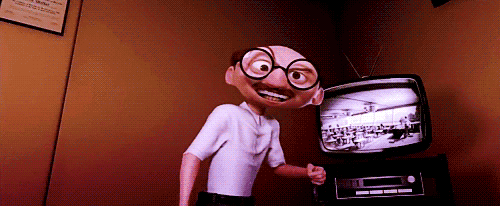
I think you see where I'm going with this.
My theory? Estelle, in her unique position as a bridge between not just the mortals and the demigods (eg. her relationship with Percy), but also the mortals and the gods (eg. her great impression on Apollo), is a living, breathing prophecy. A prophecy that the end is nigh for this current age of mankind.
Furthermore, I also think that Apollo made this connection, somewhere in the back of his mind, the very second he realized that her hair was entirely unique. According to Hesiod (who Apollo also mentions later in the book, so we know he knows who Hesiod is), the day that babies are born with gray hair (or, salt-and-pepper for the sake of the theory) is the second Zeus basically get the go-ahead to commit genocide.
This also brilliantly explains why Apollo suddenly, and seemingly without reason, makes to keep Estelle's existence a secret from Zeus, because he knows that it might be the easiest way to get everyone he knows and loves killed by his own father for "the greater good" as I'm sure Zeus will put it. Plus, in his mortal state, Rick didn't have to explain why Apollo did what he did, since Apollo's been having memory issues since the beginning of the series: why would he remember one line from a poem written almost three thousand years ago?
Frankly, Zeus doesn't care about mortals: the only reason he really cares about anyone is if they have enough power to threaten his own, or if they have some sort of power he can benefit from. This, certainly, falls under the category of the latter. Wouldn't you want a chance to remake humanity into the perfect image that it used to be? You would, if you hadn't gone through a five book long grow-a-conscience speedrun like our lovely Apollo over here.
Fortunately for Rick, this is such an outrageous theory that if it never comes to fruition, I won't be surprised. If he ever writes something similar, though, know I called it first.
EDIT: here's the fic i mentioned i was (am) writing
EDIT: a masterlist of my other metas
#riordanverse#trials of apollo#apollogists#also that fic i mentioned will definitely be including this#estelle blofis#theory#fan theory#also if you were wondering my genetics exam went well thanks for asking
540 notes
·
View notes